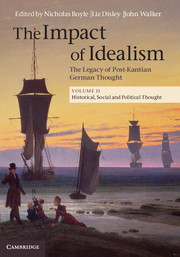Book contents
- Frontmatter
- Contents
- List of Contributors
- Acknowledgements
- List of Abbreviations
- Introduction: Idealism in historical, social and political thought
- 1 From transcendental idealism to political realism
- 2 The public of the intellectuals – from Kant to Lyotard
- 3 Idealism and the idea of a constitution
- 4 German Idealism and Marx
- 5 Ethos, nature and education in Johann Erich von Berger and Friedrich Adolf Trendelenburg
- 6 The concept and philosophy of culture in Neo-Kantianism
- 7 After materialism – reflections of Idealism in Lebensphilosophie: Dilthey, Bergson and Simmel
- 8 ‘Rationalisation’, ‘reification’, ‘instrumental reason’
- 9 Freedom within nature: Adorno on the idea of reason's autonomy
- 10 German neo-Hegelianism and a plea for another Hegel
- 11 Idealism and the fascist corporative state
- 12 Love and recognition in Fichte and the alternative position of de Beauvoir
- 13 Hegel's concept of recognition and its reception in the humanist feminism of Simone de Beauvoir
- 14 Giving an account of oneself amongst others: Hegel, Judith Butler and social ontology
- 15 Idealism in the German tradition of meta-history
- Bibliography
- Index
- References
2 - The public of the intellectuals – from Kant to Lyotard
Published online by Cambridge University Press: 05 December 2013
- Frontmatter
- Contents
- List of Contributors
- Acknowledgements
- List of Abbreviations
- Introduction: Idealism in historical, social and political thought
- 1 From transcendental idealism to political realism
- 2 The public of the intellectuals – from Kant to Lyotard
- 3 Idealism and the idea of a constitution
- 4 German Idealism and Marx
- 5 Ethos, nature and education in Johann Erich von Berger and Friedrich Adolf Trendelenburg
- 6 The concept and philosophy of culture in Neo-Kantianism
- 7 After materialism – reflections of Idealism in Lebensphilosophie: Dilthey, Bergson and Simmel
- 8 ‘Rationalisation’, ‘reification’, ‘instrumental reason’
- 9 Freedom within nature: Adorno on the idea of reason's autonomy
- 10 German neo-Hegelianism and a plea for another Hegel
- 11 Idealism and the fascist corporative state
- 12 Love and recognition in Fichte and the alternative position of de Beauvoir
- 13 Hegel's concept of recognition and its reception in the humanist feminism of Simone de Beauvoir
- 14 Giving an account of oneself amongst others: Hegel, Judith Butler and social ontology
- 15 Idealism in the German tradition of meta-history
- Bibliography
- Index
- References
Summary
Democracies corrode quite fast…They corrode because most people don't care very much about them. The difficulty of sustaining voluntary interest in the business of choosing the people who will rule over you is well attested. And the reason why we need intellectuals, as well as all the good journalists we can find, is to fill the space that grows between the two parts of democracy: the governed and the governors.
– Tony JudtTony Judt's vision of democracy is justifiably bleak; not only because he was dying when he composed these words but also because, despite its apparent near universal victory, democracy seems to be dying as well. Referring to the ‘business of choosing the people who will rule over you’ and identifying the ‘two parts of democracy’ as ‘the governed and the governors’ certainly falls far short of the democratic ideal. Are not the ruled also the rulers, the rulers the ruled, temporarily elevated? Admittedly, direct democracy in which all the people are assembled to make collective decisions has become impossible for all but the smallest of communities (the cynic might say: for all but the solitary individual); but even within representative democracy are not the representatives said to be of the people, carrying with them the trust and good will (or even a specific mandate) of the majority? What then is the ‘space that grows’ between the people and the people's representatives? Some have pointed to the routinised business of politics as a profession, creating the politician who lives less (if at all) for politics (as a calling) and more from politics, as a job like any other. Others have emphasised political parties and the oligarchic machinery that eventually transforms them. Both claims could easily be seen as the necessary result of the vast complexity of modern society, a complexity that precludes overview and transparency and therefore calls for blind trust in ‘expert’ knowledge. These and other, similar symptoms point to the fundamental structural divide that inheres in modern, liberal democracy, namely the welcome severance of the private from the public sphere. No longer participating actively in the public duty of collective decision making, the people dissolve into people, a collection of individuals pursuing private interests.
- Type
- Chapter
- Information
- The Impact of IdealismThe Legacy of Post-Kantian German Thought, pp. 26 - 50Publisher: Cambridge University PressPrint publication year: 2013



